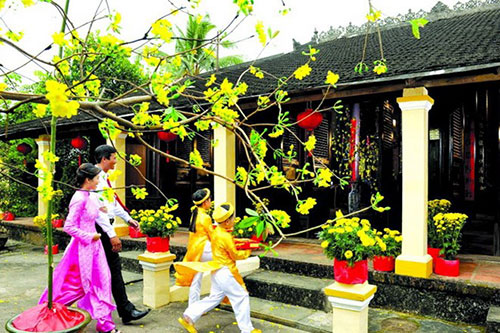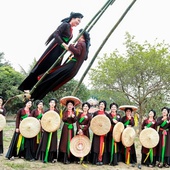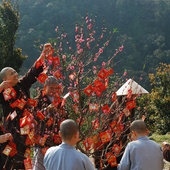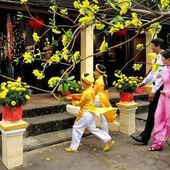Origin Of Vietnam Tradition Xông đất
Year by year, Tết holiday continues to be the most significant and celebrated festival in Vietnam, uniting everyone from the Kinh majority to various ethnic communities. One of the essential rites during this festive occasion is Xông đất, or the first visit to a home at the start of the new year. Increasingly, the Vietnamese have come to recognize the cultural importance of this tradition. It has been significantly modified over the years with a growing number of customs and criteria that both preserve the spirit of the Xông Đất ritual and adapt to modern Vietnamese life.
 Photo @thoibaotaichinhvietnam.vn
Photo @thoibaotaichinhvietnam.vn
A survey of Vietnamese people regarding the origins of "Xông Đất" would likely find that many are unsure of its historical roots. While some older individuals and cultural specialists might share insights, those stories often vary and can be perplexing.
Xông đất and its connection to Taoism
Many Vietnamese and cultural experts believe that Xông đất has its roots in Taoism, which was popularized in Vietnam thousands of years ago. This tradition primarily stems from the agricultural cultures of Southern China, focusing on harmonious living with nature and the surrounding community.
Taoism has become widely embraced in Vietnam among ordinary individuals, especially farmers, merchants, and vendors, due to its emphasis on nature. Consequently, this religious tradition has left a substantial mark on Vietnamese culture.
Vietnamese people have a deep-seated desire for longevity and prosperity in their endeavors, seeking ways to fulfill these aspirations. Guided by Taoist principles about the harmony of the five natural elements (fire, water, earth, metal, and wood), Vietnamese individuals often select their first visitor (the person who performs Xông đất) based on compatibility, hoping for luck and success in the new year. For instance, it is commonly believed that water supports trees, leading to the belief that individuals associated with "Water" are ideal visitors for those associated with "Tree." This belief in harmony extends beyond the Xông đất practice to various aspects of Vietnamese life, such as building homes or purchasing vehicles and properties.
The 12 Zodiac animals' doctrine and its impact on Xông đất
Another theory posits that Xông đất may have originated from traditional rites linked to the worship of the 12 Zodiac animals.
The 12 Zodiac animals comprise Rat, Buffalo (also known as Ox in Chinese culture), Tiger, Cat (or Rabbit in Chinese culture), Dragon, Snake, Horse, Goat, Monkey, Hen, Dog, and Pig. They are grouped into six pairs that can be either auspicious or inauspicious towards one another, representing the dynamics of fortune, success, and favor.
Some examples of complementary astrology include:
- Household head: Rat - First visitors: Monkey - Dragon - Buffalo
- Household head: Buffalo - First visitors: Snake - Hen - Rat
- Household head: Tiger - First visitors: Horse - Dog - Pig
- Household head: Cat - First visitors: Goat - Pig - Dog
Occasionally, the choice of the first visitor for the family may hinge on other factors. Some individuals, while not perfectly aligned with the household head's astrological sign, are favored for their amicable nature or reputation as "luck-bringers." The reverse can also be true. Over the years, the importance of the Xông đất tradition has grown, as people increasingly prioritize spirituality and their beliefs, emphasizing the significance of selecting the right individual for Xông đất.
Read more: Do's and Don'ts when Xông đất

Folk Games During Tet Holidays
In the country area, Tet is often a holiday to celebrate with games, folk singing and village feasts. Get to know some of the most popular communal games during Tet holiday.

Visiting Pagodas On New Year Days
Together with the festive atmosphere Tet brings to Vietnam every year, the event also the best time of the year for Vietnamese to show their religious belief and traditional custom. Among them, visiting pagodas on the first days of the year has long been a lofty tradition.

Do and Don't When Xong Dat
Tet Nguyen Dan- the biggest festival of the year- plays an extremely essential role in Vietnamese’s beliefs and culture. Among many complicated religious rituals performed in this occasion, “xong dat” (first visit to a home in a year) is believed to decide the fortune of the host for the whole year.











